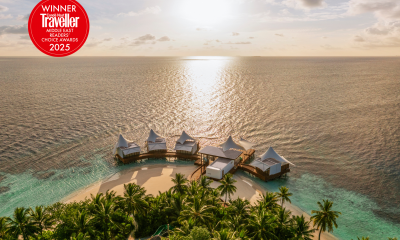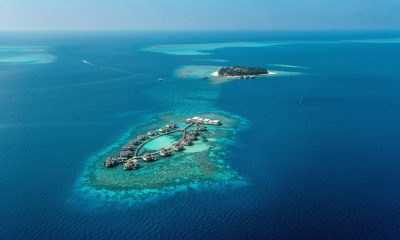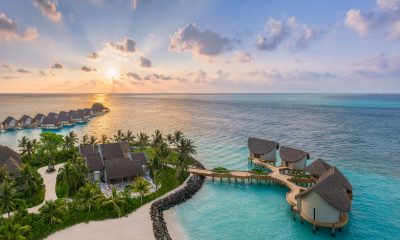Blog
Travel trends post Covid-19

By Craig S. Smith
At this time of heightened uncertainty, there are two things I’m sure of. First is that Covid-19 will forever change the way we travel. Second is that we will travel again.
A full rebound may not happen anytime soon, but already some markets in Asia Pacific are showing early signs of recovery. The resilience of travel demand is evident as we see Greater China start to recover. All our 360+ hotels have reopened and occupancy at our hotels in the region had reached 40 per cent in May. We’ve also started to see recovery in South Korea, Vietnam, Australia and Thailand. Our resorts in Thailand saw pick up from domestic travellers with occupancy at almost 100 per cent.
As restrictions ease, I must thank all our associates, who continue to work tirelessly to ensure that we can welcome our guests back safely when they are ready to travel again. Our associates are the heart of our company, and I am proud of every single one of you.
As we slowly recover, we must be mindful that today’s new normal is here to stay and that means changes are in store for the travel sector. I’d like to share some trends we’ve observed.
Uptake in staycations and leisure travel by young and experienced travellers
Travel recovery usually begins domestically. For example, now, more than 90 per cent of our guests in China are Chinese traveling for either leisure or business. We’ve started to see a large uptake in staycations and domestic leisure travel. Shorter trips to destinations closer to home are also becoming a popular choice as people move out of lockdown. People are opting for road trips to explore a refreshing change in environment, without having to forfeit their holidays. Post-lockdown, young travellers and the non-family segment are expected to be the most eager to explore the world again, just as we have seen in China so far.
In China, travel returners are the young generation and those without family. McKinsey estimates that on Tomb Sweeping Day, the first holiday following the pandemic, 60 per cent of the people who booked trips were below the age of 30 — a significant increase from 43 per cent in the same period last year. This resonates with our occupancy data. At The Sanya EDITION, our average guest demographic decreased by 5-10 years, from 28-35 to 23-28. Young couples and groups of friends are leading the charge.
The younger generation does everything through their phones, and we have been investing heavily and rolling out technology quickly to move our services online. This has led to a change in booking behaviour where more and more booking is made through our Marriott Bonvoy app.
Safety and hygiene is ‘the new amenity’
Covid-19 has changed travel behaviour. In Asian countries between 78-88 per cent people say they are now more fastidious in their personal hygiene. Safety and hygiene has become the must-have amenity that travellers demand when booking stays.
In April, Marriott International launched a global cleanliness council to promote even higher standards of hygiene to increase the level of safety for our guests and our associates. Our guests can expect more hand sanitising stations in public areas, re-arrangement of furniture to allow more space for distancing, especially in restaurants where we are designing new approaches to buffets. For meeting and events, guests will see reduced seating capacities, F&B options which include Grab + go, canned + bottled beverages, and plated service.
We are also offering worry-free cancellation policies and flexible booking measures such as extended member privileges for peace of mind.
Mobile technology is going to be essential to providing reassurance and distancing options for our guests. In over 3,200 hotels across the world, guests can now use mobile check-in, access their room and order room service without any physical or close contact.
Trust in our brand
We know there is a lot of pent-up demand for travel, and it will still take some time for travel to recover, but when it does resume, we know that guests will be more comfortable returning to a brand that is familiar to them and trusted.
We are still on track to meet our hotel signings goal for 2020. This underscores the trust hotel owners have in Marriott International as a brand.
Despite the current climate, there is still a strong demand for our brands and there is continued optimism for the growth of Asia. Later this year we will see the debut of JW Marriott, EDITION, AC Hotels and Aloft Hotels in Japan. We’ll also see the debut of The Ritz-Carlton in the Maldives and Moxy Hotels in China.
Experiences in F&B
Travellers are increasingly in favour of takeaway or delivery options as they look to enjoy dining but without needing to venture far (or at all). We’ve created new ways for our guests and non-staying guests to enjoy the same great dining experiences that they come to expect from us.
In China, we partnered with Eleme, an influential food delivery online platform powered by Alibaba, to offer food delivery from 32 hotels.
In APEC, we are also piloting food delivery services in Bangkok, Kuala Lumpur, India and Singapore. “Marriott on Wheels” in India provides takeaway and food delivery within a defined radius of 30 hotels, while in Australia our hotels are providing experiential dining hampers.
We have also rolled out exclusive dining privileges for Marriott Bonvoy members, so they earn points from dining even for takeaway.
These are unprecedented times of dramatic change and we are committed to doing what is necessary to provide our guests with the safety and assurance that they seek.
I can’t wait for the day I can travel again, I‘m sure you can’t either. But in the meantime, stay safe.
Note: This op-ed was originally published on Linkedin by Craig S. Smith, Group President – Asia Pacific at Marriott International.
Blog
How to diversify Maldives’ tourism-heavy economy
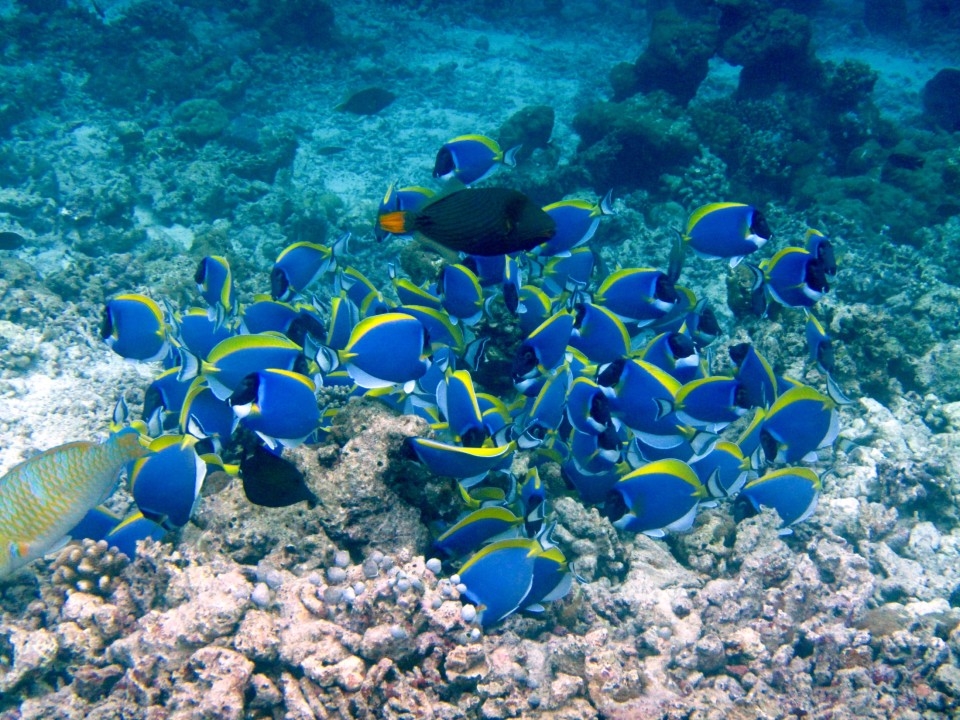
By Sonu Shivdasani
At Soneva, we adhere to the principle that local is best. Whether it’s food produced by our organic vegetable gardens or the fish we source from neighbourhood fishermen, local produce is always fresher, better tasting, and more sustainable.
Producing things within the country, rather than importing everything from abroad, also makes economic sense. And the greater variety of products and services you produce in-house, the easier it is to diversify the economy, making it more resilient.
In an Op-ed that I wrote last year, I mentioned that, “The Maldives is one of the world’s best places to operate a resort. And yet, the cost of borrowing the money to build one is eye-wateringly high. How do we explain this paradox?”
During a recent conversation with a Male-based banker, I was told why lending rates in the Maldives are so high: there is a perception of risk among the financial community because the Maldivian economy is so dependent on tourism.
As Maldivian President Ibrahim Solih, said during his National Day speech on November 11, 2020: “Covid-19 has made us realise our economy cannot solely depend on tourism. This is something we have always debated, yet failed to adequately address.”
It’s easy to understand why the Maldives wants to put some of its eggs in baskets other than tourism. Covid-19 has swung a wrecking ball at Maldivian tourism, which in turn has devastated the government’s finances, foreign currency reserves, and the value of the Ruffiya, which are all dependent on tourist dollars.
Though tourism is recovering since the border reopened in July, and many resorts (including Soneva Fushi and Soneva Jani) are currently as busy as they were last year, a few good months at the end of the year won’t make up for the carnage of March-July. And so, how to diversify the Maldives — a country that’s 99 per cent ocean, and with a small population?
Extracting better value from Maldives’ fish catch
An obvious place to start is in areas the Maldives already does well: fishing. Although the Maldivian fishing industry is already large, much of the value of the fish is in the processing, not the catching.
Here, the Maldives could improve. Instead of selling frozen, whole tuna to Thailand, more money would be made if all Maldivian fish were canned in the Maldives. The fisheries ministry recently said as much; announcing plans to expand cold fish storage.
The branding of Maldivian tuna could also be enhanced. The Maldives operates the world’s most sustainable fishing fleet. Every fish is caught by hand, with a pole and line, one-by-one. Nets and long-lines are banned, meaning there is almost no by-catch of sharks, turtles, dolphins and other charismatic or endangered sea creatures.
More could be made of this inherent strength, especially as consumers in Western export markets demand more sustainable food. Maldivian tourism is globally renowned for being the world’s most luxurious. Maldivian fish should be equally known as the world’s most environmentally friendly.
Growing our own food
Although the Maldives is 99 per cent sea, let us not forget about what can be done on that 1 percent of land. It’s heartening to see a big government push towards growing more food. There is huge demand, especially from resorts, for locally-grown, fresh produce.
Both Soneva Fushi and Soneva Jani have highly productive fruit, vegetable and herb gardens that supply the bulk of the ingredients for our restaurants. What we don’t produce ourselves, we strive to buy locally to maintain freshness and reduce carbon emissions. Over the summer Soneva also released a series of video tutorials based on our experiences, showing ways to farm in the Maldives, either on a commercial scale or in a window box.
Looking beyond farming and fishing, another opportunity the Maldives could explore further is its relationship with India.
The $1.4 billion assistance granted by India in 2018, and the more recent economic aid package, have both been of great help. But, rather than aid, the Maldives should engage with India to see how it can grow its economy both through tourism and non-tourism means to develop closer ties with this populous and economically significant neighbour.
Potential offshore financial hub
For example, the Maldives could enter into a double tax treaty with India. The Maldives could also negotiate with India, to allow Indian citizens to make personal investments in the Maldives and be able to remit more than $250,000 — the current Reserve Bank of India limit on any foreign currency remittance by an Indian in a particular year. In addition to this, perhaps more Indians could be allowed to pay for personal investments in the Maldives with Rupees. These Rupees could then be used by the Maldives to buy Indian goods.
With a double tax treaty with India in place, the Maldives could explore the opportunity to become a financial centre. Could the Maldives become India’s offshore financial centre, playing a similar role that Hong Kong does to China?
There is a closer Indian Ocean example; in 1989, Mauritius’ government decided that its economy was too dependent on tourism and sugarcane, so it chose to make the country an offshore financial centre.
Mauritius initiated double tax treaties with 18 African countries and India. Like the Maldives, Mauritius’s tax rate was considerably lower than the 18 African neighbours and India. As a result, foreign investors who wanted to invest in India or these 18 African countries set up companies in Mauritius, helping them to legally reduce their tax bills. There are now 20,000 offshore Mauritius companies.
On average, the basic statutory fees that the Mauritius government charges, such as directors fees, and stamp duties for operating companies, come to $5,000 per year. For all the offshore companies registered in the country, these fees tally up to $100 million per year — a huge source of revenue for the government.
Moreover, according to a recent report, Mauritius-incorporated offshore companies have $630 billion of assets. This is 50 times Mauritius’ GDP. If we assume that these companies achieve a 10 per cent return on capital, that means they have net profits of around $63 billion. It is likely that the Mauritius government received more than one per cent of these profits as taxes. Even at one per cent, this is the equivalent of $630 million of revenue to the government.
It has taken Mauritius 30 years to get to where it is. If the Maldives starts today, potentially in 30 years’ time, the government could generate more revenue from offshore finance than from tourism. There are many considerations when setting up an offshore centre. We have recently seen a global backlash against tax havens, so this will require a lot of thought and consideration. But, it is an opportunity.
Second-home schemes and outsourcing
Introducing second home schemes for foreigners is another way to diversify the economy. The government recently changed the law to allow foreigners to become resident in the Maldives if they invest $250,000 dollars, and deposit another quarter of a million in a local bank’s fixed deposit account for at least five years. Similar programmes, in countries such as Malaysia, are very popular. They make it easier for the government to sell debt and help ease dollar shortages.
Lastly, the Maldives could also look to offshore business process outsourcing, which has made cities such as Bangalore wealthy. These days, a British or American customer ringing into a bank call centre is as likely to speak with someone sitting in Bangalore or Hyderabad as Birmingham or Houston. While the Maldives does not have the huge pool of labour that India does, young Maldivians speak English well, so offshore processing could be done, albeit at a smaller scale.
The Maldives has paid a heavy price this year for its over-dependence on tourism. Nobody predicted Covid-19, or the impact it has had on the economy. But, as any good investor will tell you, the best way to mitigate risk is through diversification.
Editor’s Note: This op-ed was originally published on Linkedin by Sonu Shivdasani. Sonu is the founder and CEO of Soneva, which owns luxury resorts Soneva Fushi and Soneva Jani in the Maldives, and Soneva Kiri in Thailand.
Blog
A day in the life of Amilla Maldives’ HR Special Projects Manager
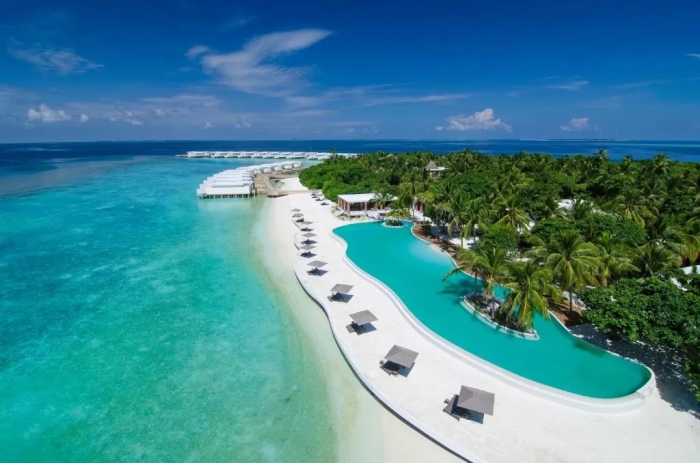
Hussain is a well-known face at Amilla Maldives as the resort’s energetic Assistant Manager of Recreation. With lower demand due to the pandemic this year, Hussain pivoted to a three-month secondment in HR Special Projects.
These unique projects are aimed at maximising the quality of life for everyone working at Amilla. They range from renovating the Islanders’ accommodation block to transforming the staff bar into a chilled-out café-style community space.
This dynamic and multi-talented Islander has also helped plan and run staff events — creating some dazzling decorations in the process. He has even channelled his inner artist to create paintings to brighten up staff areas.
Hussain originally hails from Kurendhoo, a small island in Lhaviyani Atoll. We caught up with him to find out more about how he’s ringing in the changes behind the scenes at Amilla.

How does a typical day begin for you?
With my current role, I don’t so much follow time as follow projects and people. So, I normally wake up around 6am, read the news from the Maldives and around the world for half an hour, do 15 minutes of stretching and warming up for the day, take a shower and then I’m ready to start my day.
Often, when I start something, I’ll have to finish it, otherwise I just cannot sleep! So, sometimes, if I had a late night, I’ll wake up at around 7am but never later than 7.30am, so I can get things done.
Every day can be different depending on my tasks, but one of my favourite things to do is making decorations for staff events. Everybody says I’m really good at it. I also like doing carpentry and painting abstract stuff. The management has given me a lot of opportunities to try out new ideas and the freedom to learn new things, which I really appreciate.
How closely do you work with the other Islanders on your projects?
The best resource of any company is their staff. If we don’t care for them, they won’t enjoy their jobs or their life with us. So, our first priority is always our staff and our guests.
Getting feedback every day is the biggest thing in HR Special Projects. Before we make any new service or changes, we get feedback from the staff. That’s because we need to give them what they want where this is possible. Normally, lunchtime is the best time to go speak to them. The best way I’ve found to do it is to have a friendly chat. I just go to wherever they are, have a coffee with them, then ask them in a friendly way. Otherwise, if I just ask them formally, they might not open up.
What has been your favourite special project to work on so far?
I thought something I really had to do was provide what the Islanders really need, so I started working with the Bliss tuck shop, because it’s difficult to get what they need from other islands, especially with the Covid-19 restrictions. So, I’ve changed the concept and created more options as well as redesigned the shop. Red Bull is the most popular item, of course! It’s their basic need, they enjoy it a lot. But although we have a canteen, we didn’t have anything like a café area for them to enjoy the drinks they bought from the shop.
What was the solution?
We have a nice bar which needs a little attention to evolve the concept into something new because as Maldivians, with our culture, we’re not allowed to drink alcohol. So, if we have a bar where people think it only serves alcohol, it means some of the staff can be there, but some might not feel comfortable. I’m leading on the project to transform the bar into an area where the Maldivian staff and expat staff can enjoy things together as one family. This new concept will be more than a bar, it’ll be more like a café area where staff can also do things like book a cinema night, or celebrate a private birthday party with their friends, and so on.
How did you end up in this special projects secondment?
I went back to my island when the Covid-19 pandemic hit but they called me to ask if I was interested in this role. Before this I was working in recreation. I love being active and working with guests and wanted to be back at Amilla with this new opportunity to help me grow and have new experiences.
Can you tell us about your journey to working in recreation?
When I was a teenager, I loved sports and I wanted to play sports professionally, but unfortunately there weren’t many opportunities in the Maldives at the time, so I decided it wasn’t a good idea. Then I decided that recreation at a resort would be a good job because then you get to do everything. But it was hard to get into, so I actually started working in childcare at another resort.
I love kids and it was fun. I spent four years there and became Kids Club Manager, but I still wanted to get into recreation. So, I took a step down to become a Recreation Supervisor at another resort and then finally became Recreation Manager. It was hard to take a step backwards, but it was worth it .
Then I got a knee injury and couldn’t do sports anymore. I had to slow down and from there I decided to learn more about creative art and tennis too. Then this year I got offered the chance to join the HR team, taking care of special projects and staff communications.
I learned one thing from my past; I didn’t follow my passion when I was a teenager to become a professional sports player because of the restrictions including my injury. But I ended up learning many other things that I can use to create beautiful things or to make magic, as our HR Director says! And now with the knowledge and experience I have, I just want to help other people to be happy and follow their passions.
For more information about the resort and bookings, please email sales@amilla.mv or visit www.amilla.com
Action
Sustainable development of coral reefs at Cinnamon Dhonveli Maldives

Renowned for its iconic stunning over-water suites, Cinnamon Dhonveli Maldives is a beautiful tropical island resort offering exclusive access to the classic Pasta Point surf break, described as the “wave-machine” of the North Malé Atoll due to its consistent four to six foot waves.
Green Globe recently recertified Cinnamon Dhonveli Maldives.
The resort first started their coral restoration project in 2018 to help replenish diminishing coral reefs and have continued to develop this initiative since then.
“Coral reefs represent some of the world’s most spectacular beauty spots. They are also the foundation of marine life, without them many of the sea’s most exquisite species will not survive,” Sanjeeva Perera, General Manager at the resort, explained.
“The awareness and in-depth knowledge we receive from Green Globe during the recertification process continues to guide us on the correct path to take in the bold steps forward toward the sustainable development of coral reefs that will benefit future generations in the Maldives.”
Coral reefs in oceans all around the world are dying. It is estimated that nearly one sixth of these reefs will be dead within the next twenty years.
In keeping with the commitment of Green Globe members to manage and operate businesses to the highest level of sustainability, the Cinnamon Dhonveli team initiated this mariculture project two years ago focusing on the pre-emptive restoration and rejuvenation of reefs affected by coral bleaching.
The project uses ‘reef balls’ as artificial reef structures implanted with Mari corals that are cultivated in special nurseries. The reef balls are then transplanted onto the bare substrate to grow.
With marine conservation at the heart of their sustainability vision, the Cinnamon Dhonveli team is committed to making their artificial coral reef propagation project a great success in the Maldives.
They also aim to set up a Marine Discovery Centre to educate visiting youth and children in coral reef propagation, environmental awareness, and the rearing and rescue of sea turtles.
Located no more than a 25-minute speedboat ride from the main Velana International Airport, Dhonveli’s proximity and diversity combine to make it one of the most popular destinations in the Maldives.
The island is constantly buzzing with action as divers, surfers and beach bums alike find a common ground in the world of excitement this little island has to offer. Magnificent waves and a policy of sustainable surfing combine to make Pasta Point at Cinnamon Dhonveli one of the most sought after surfing locations by award-winning surfers from around the world.
Large families, groups of friends, divers and snorkelling buffs all seem to find a comfortable common ground in the heady atmosphere of the 16-acre island as well. Sink your teeth into our succulent seafood and indulge in the theme nights at each of the three restaurants with the best of international cuisine. Unwind at the spa or sink into the comforts of the 148 plush rooms.
-
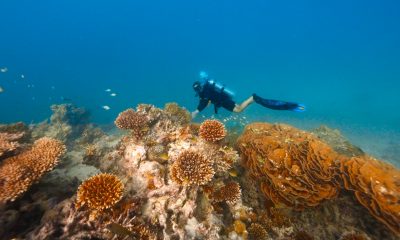
 News1 week ago
News1 week agoVentive Hospitality aligns Maldives portfolio with Green Fins marine sustainability platform
-
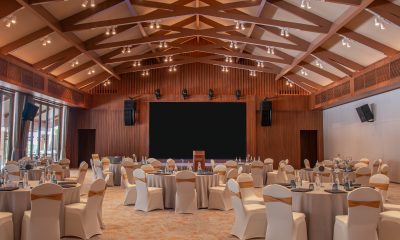
 Business1 week ago
Business1 week agoFeydhoo Hall opens at dusitD2 Feydhoo Maldives as new event space
-
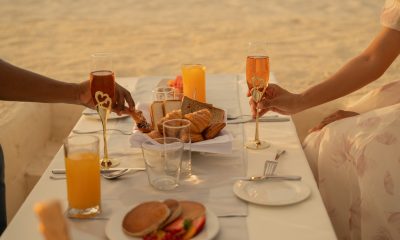
 Cooking1 week ago
Cooking1 week agoFrom shoreline to hotpot: New dining experiences at Sun Siyam Iru Veli
-

 News6 days ago
News6 days agoThe Ritz-Carlton Maldives, Fari Islands launches conservation programme for environmental observances
-
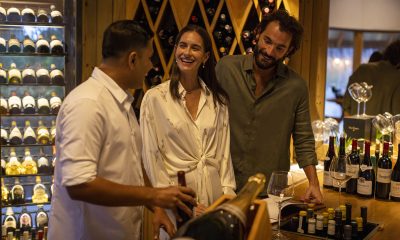
 Drink1 week ago
Drink1 week agoProvence comes to Maldives with Château Minuty dinner at Milaidhoo Maldives
-
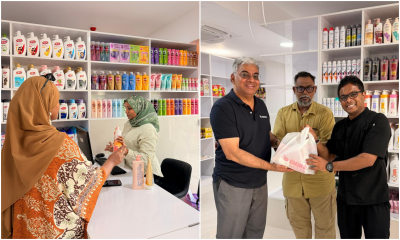
 Business1 week ago
Business1 week agoBBM expands retail presence with new Hulhumalé outlet
-
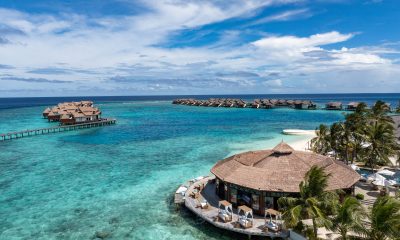
 Awards1 week ago
Awards1 week agoDouble gold win for OZEN RESERVE BOLIFUSHI and OZEN LIFE MAADHOO at Junior Travel Awards
-

 Featured1 week ago
Featured1 week agoCity Iftar experience curated at JEN Maldives by Shangri-La



